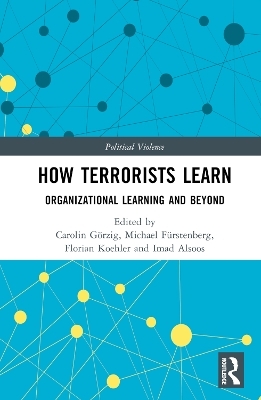
How Terrorists Learn
Routledge (Verlag)
978-1-032-42156-8 (ISBN)
This volume helps us understand the transformations of terrorist organisations, and the conflicts they are involved in, by broadening the perspective on what is considered terrorist learning.
Using a variety of methodological approaches and empirical data, the volume offers a look at the clandestine inner lives of groups from different continents and ideological backgrounds in order to explore from whom they learn and how, and what the outcomes are. Their internal and external interactions are examined within their socio-political contexts to illuminate how they adapt to challenges or fail to do so. Unpacking the question of ‘how do terrorists learn’ helps us to grasp not only changes of violent means of action but also of operational and strategic approaches and, ultimately, even transformations of the ends pursued. The chapters demonstrate that terrorist learning is not principally different from that of other human organisations. The contributors draw on conceptual frameworks of organizational learning, but also broaden the scope beyond the organizational framework to acknowledge the variety of forms of informal and decentralized learning characteristic of much contemporary terrorism.
This book will be of much interest to students of terrorism studies, violent extremism, organisational studies and International Relations.
Carolin Görzig is a Research Group Leader at the Max Planck Institute for Social Anthropology, Halle, Germany. Michael Fuerstenberg is Senior Research Fellow at the Max Planck Institute for Social Anthropology, Halle, Germany. Florian Köhler is Senior Research Fellow at the Max Planck Institute for Social Anthropology, Halle, Germany. Imad Alsoos is Senior Research Fellow at the Max Planck Institute for Social Anthropology, Halle, Germany.
1. Introduction: Tackling the Complexity of Terrorist Learning Part I: Learning of Organizations 2. Double-loop Learning in Terrorist Organizations: Facilitators and Impediments 3. Downgrading or Upsizing Strategies: How Rebels Learn about the Right Repertoire of Violence 4. Social-Media Jihad as a Learned Strategy: How Daesh Learned but Failed to Exploit Western Vulnerabilities 5. Learning Patterns and Failures: An Analysis of ISIS Operations between 2013 and 2019 Part II: Learning beyond Organizations 6. Adaptation of Propaganda and Communication: The Online Magazines of al-Qaeda and the Islamic State Compared 7. Terrorist Tactical Diffusion Among Lone Actors: Explaining the Spread of Vehicle Ramming Attacks 8. Learning through the Migration of Knowledge: Exploring the Transition of Operatives between Violence Organisations 9. Decentralized Collective Learning: Militant Accelerationism as a Community of Practice 10. Conclusion: What Have We Learned about Terrorist Learning?
| Erscheinungsdatum | 05.09.2023 |
|---|---|
| Reihe/Serie | Political Violence |
| Zusatzinfo | 10 Tables, black and white; 11 Line drawings, black and white; 11 Illustrations, black and white |
| Verlagsort | London |
| Sprache | englisch |
| Maße | 156 x 234 mm |
| Gewicht | 557 g |
| Themenwelt | Sozialwissenschaften ► Politik / Verwaltung ► Europäische / Internationale Politik |
| Sozialwissenschaften ► Soziologie ► Empirische Sozialforschung | |
| ISBN-10 | 1-032-42156-8 / 1032421568 |
| ISBN-13 | 978-1-032-42156-8 / 9781032421568 |
| Zustand | Neuware |
| Informationen gemäß Produktsicherheitsverordnung (GPSR) | |
| Haben Sie eine Frage zum Produkt? |
aus dem Bereich


